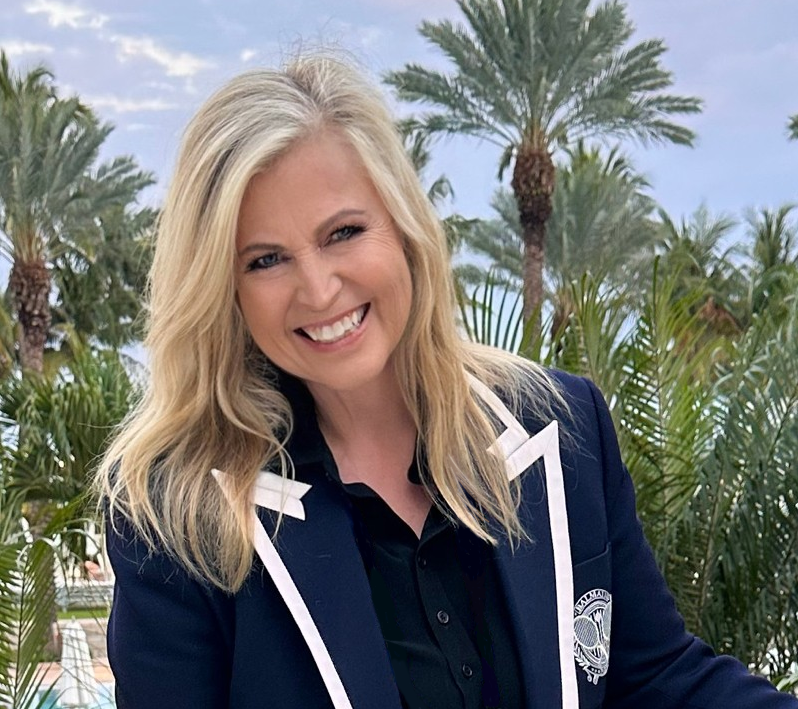When your company aims to find people good jobs, you’d better deliver for your own team too.
Heidi Golledge, founder and CEO of Jobot, has some cred in that department. Her online career platform, which leverages AI to connect job seekers with opportunities and match its recruiters with candidates for clients, gets about 60,000 applicants a day. Last year, it ranked No. 3 on Fortune’s 100 Best Medium Workplaces list.
So I was curious: What’s it like for Jobot’s roughly 500 employees? How does the largest permanent placement company in the U.S. create a good experience for them?
For starters, everyone is treated with kindness and respect, Golledge tells me from Jobot’s HQ in Newport Beach, Calif.: “It doesn’t [matter] if it’s a junior person who just started last week or a senior VP.”
Then comes psychological safety. Jobot is a sales organization whose recruiters have to bill and perform, Golledge notes. “So the best thing that we can use to make people feel safe is this understanding of expectations and making it as clear as possible,” she says. “The idea is that you can have, I would say, tough love by being very direct.”
That, and a “no jerks allowed” policy. “In recruiting, you have toxic leadership that belittles people,” Golledge says. “We have zero tolerance for that.”
People also want to feel valued, explains Golledge, who launched Jobot in 2018 after cofounding two other companies in recruiting and tech. Part of that is giving them a chance to add to their skill set. “Three years from now, five years from now, you’re not doing the exact same position for just slightly more pay,” says the three-time EY Entrepreneur of the Year winner. “You’re constantly improving.”
For example, Jobot moved its director of events over to digital branding, where she’s working with software engineers and designers to redo the company’s website. “It’s really understanding each person and what they bring to the table,” Golledge says. “And then having an open dialogue about how that would affect the business and what they would be most excited to do.”
Jobot also makes joy part of the employee experience, Golledge says, by doing things like playing virtual games or holding a recent event in Bora Bora. But the fun stuff doesn’t work without a solid foundation of trust, she warns: “Those things are only valuable if you have those core tenets of kindness and respect, and the psychological safety, already.”
Listening to employees is crucial too. Every quarter, Jobot does so-called 360-degree reviews where staff confidentially assess every manager, Golledge included. Managers are rated on a scale of 10, with one receiving an award. “If anyone has any score below nine on an average, then they typically would meet with me as well as other leaders to figure out what’s the issue,” Golledge says.
Ensuring that people are heard is a trust builder, she maintains: “The more that you can do that and have an open dialogue, the more there’s trust.”
That’s good for business.
“The more trust that people have, I feel like the more effort that they give,” Golledge says. She compares sales to going out on a limb to grab an apple, then splitting it with the company: “You don’t want to go out on a limb if you don’t trust that there’s a strong tree to hold you.”
Golledge has some advice for other leaders who want to build trust.
“If you really want to lead well, you should have empathy for your team and understand why they’re even doing this job beyond just [money] and figure out how you can help them,” she says. In return, “they will help the company, and they’ll help you become a stronger leader.”
Definitely worth applying.
Nick Rockel
nick.rockel@consultant.fortune.com
IN OTHER NEWS
Delivering trust
Andy Jassy wants people to be straight shooters at work. Earning the trust of peers and managers starts with being genuine, the Amazon CEO recently said. That means challenging others if you disagree with them, Jassy added. He also urged leaders to be self-critical to the point of cringeworthy. Final pro tip from Jeff Bezos’ successor: Support your words with action and data. Is that an order?
Mouse trap
Trust me, you’re going to want to keep your mouse forever. That’s the pitch from Logitech’s new chief executive, who envisions a future where people subscribe to a high-quality version of the computer gadget. In a true flight of fancy, Hanneke Faber likened that software-enabled mouse to a Rolex. Either way, it would be the gift that keeps on giving for hardware makers.
Bad robot
Turns out workers don’t trust AI to rescue them from endless toil. In a new survey by freelancing platform Upwork, more than three-quarters of employees reported that AI tools have made them less productive and piled on more chores. Meanwhile, half of respondents said they have no clue how they’ll make the productivity gains their bosses want. Surprise, surprise: Nearly all execs surveyed said they expect such a boost. ChatGPT might not have the answer.
Course correction
Can Kelly Ortberg restore trust in Boeing? The new CEO of the troubled aircraft maker will need to do three things, analysts say. First, Ortberg, who replaced Dave Calhoun, must change the company’s culture by bringing it back to basics. Second, he must make Boeing an innovator again. Third, Ortberg must improve communication and transparency. It all adds up to a long-haul flight.
TRUST EXERCISE
“The 2024 Presidential election has gone from déjà vu to a whole new ball game—and it is time to reconsider all the assumptions about what factors and which voters will decide the outcome of this race.
While we don’t yet know exactly how the presumptive nominee Kamala Harris and Donald Trump will campaign for the presidency, we do know precisely which voters a winning campaign will need to engage and persuade to come out on top in November.
This year, polls have consistently indicated that younger, unmarried voters are a crucial demographic for both Democratic and Republican campaigns alike. These voters have only known a digital world, where anything they want or need is just a click away, including a date. One out of every seven voters has used Tinder in the last year.”
Matt Canter and Sara Fagen know from young voters. Their polling firms, Global Strategy Group and Tunnl Data, joined forces with Tinder owner Match Group to survey singles under 36 who recently used an online dating app. Politically, it’s a highly engaged group, they report.
“Tinder singles” are also fluid in their voting choices, Canter and Fagen note. This bloc, which votes on issues rather than along party lines, could tip the balance in November’s election. High on their list: reproductive rights.
To earn trust, Canter and Fagen say, politicians must hear and address their concerns. They must also convince Tinder singles to vote—no easy feat, given that almost half of female survey respondents might swipe left on election day. Getting this group to commit might also prove challenging, but a first date would be a good start.












